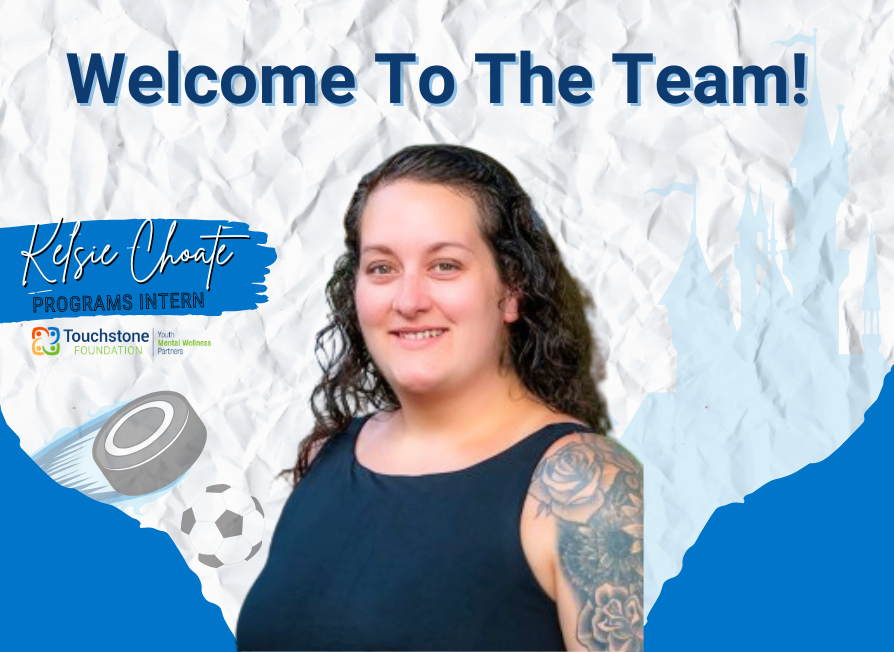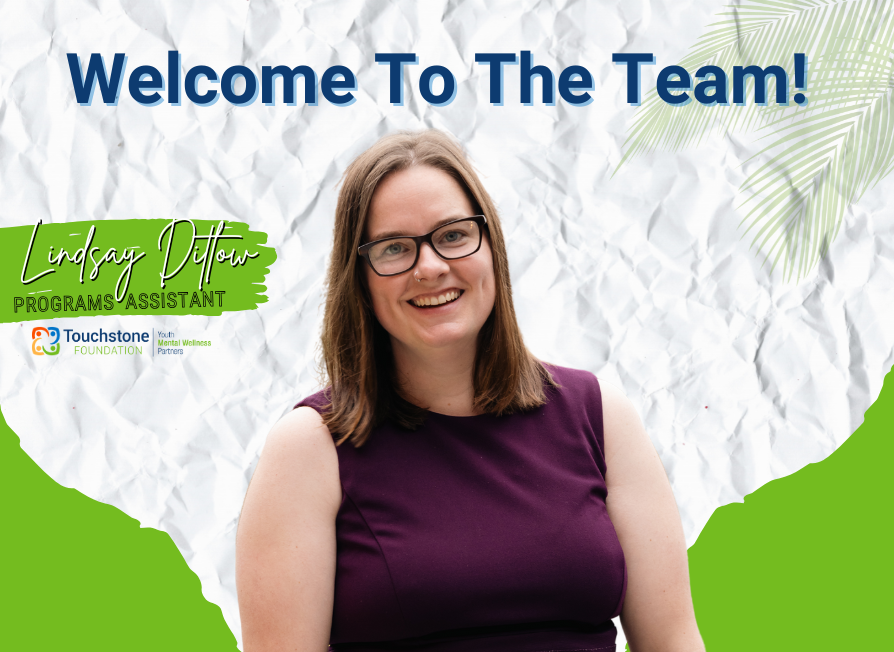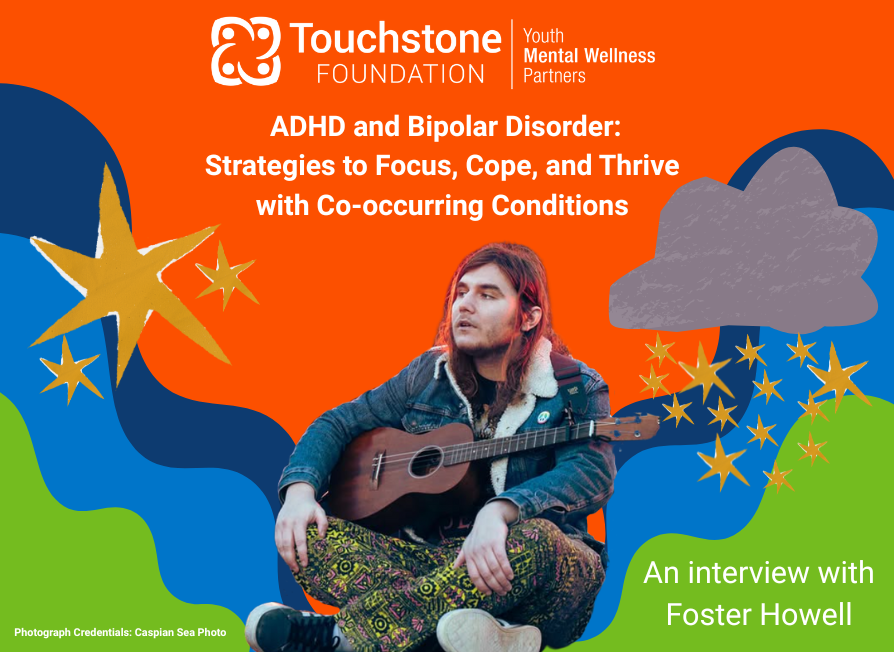This month Touchstone Foundation celebrates its 24th anniversary! We asked our board members a variety of questions regarding their mental health journey and we wanted to highlight a few of them.
Wayne Groff, CPA: Lancaster County Resident for his Whole Life
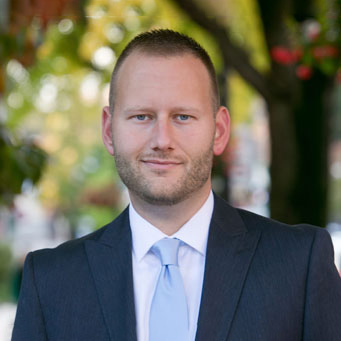
Q: What is your profession and how long have you been in this profession?
A: Wayne is the CFO at Lancaster County Community Foundation for the past 8 years, where he oversees the investment, finance, and accounting functions, and enjoys interacting with fundholders. Prior to that, he has more than a decade of experience as an audit manager at both RKL and KPMG.
Q: What does mental health mean to you?
A: I believe that health is the most important facet of life, and one that our community still struggles with how to provide equitably, affordably, and proactively. Mental health to me means being able to live your life to fullest, and having resources available to assist when needed without stigma.
Q: Why did you join the Touchstone Foundation board?
A: I believe that mental health, particularly youth mental health, is an area that continues to be under-resourced but in increasingly high demand in our post-covid and high-tech world. I am pleased to assist our efforts even in this small way as Treasurer.
Q: What is one piece of advice you would give to children/youth in Lancaster seeking to improve their mental wellness?
A: Get outside as much as possible!

Amanda Katchur, Psy.D.: Lancaster County Resident for Almost 10 Years
Q: In your own words, please tell us who you are and what you do in the community.
A: I am a licensed psychologist and have been working at Community Services Group for almost ten years. I have had so many opportunities to connect and work with some incredible young people and their families. I currently serve as Program Coordinator for our School-Based Outpatient Therapy Program and deeply value the connections I have made with the local school districts that we serve. Outside of work, I serve on two other local boards for The Arc Lancaster Lebanon and Aaron’s Acres. Volunteering and advocacy are two passions of mine and I am energized by working with others toward a common goal. I have two young children and love to be with them and to do things as a family. Each of my children have special interests that I have learned so much about and enjoy connecting with them that way.
Q: What is your profession and how long have you been in this profession?
A: Licensed Psychologist, I have been a psychologist since 2016 but have been working in the mental health field in some capacity since I was 18 years old.
Q: What is your journey with mental wellness/health?
A: As both a professional and a parent, I have really come to realize the importance of making my own mental wellness a priority. This is something that I need to be very intentional about doing or else it can sometimes fall by the wayside. I have experienced anxiety throughout much of my adult life and also more significally following the birth of both of my children. Despite being a psychologist, I was not prepared for how significantly my mental health could be impacted by perinatal depression and anxiety. I learned a lot from working with my own therapist during that time and have continued to learn more so that I can help others who have had a similar experience in my day-to-day work.
Q: Why do you think mental health awareness is important?
A: Being aware of mental health and also ways to promote mental wellness is important because you never know who is listening, watching, and learning from your experiences. There have been many times that hearing someone share their story or about their experiences with mental health has helped me to realize things about myself and others. The more than we talk about mental health, the more that we can increase awareness and decrease stigma.
Q: What is one piece of advice you would give to children/youth in Lancaster seeking to improve their mental wellness?
A: First, it is always okay to ask for help. There are so many resources in Lancaster that can be a support for young people in Lancaster to help build their mental wellness. Second, find one thing every day (no matter how small) that you can do to take care of yourself. Building that into your routine will help to increase mental wellness over time and signals to yourself that you are a priority.
Connell O'Brien, M, ED: Lancaster County Resident for 19 years
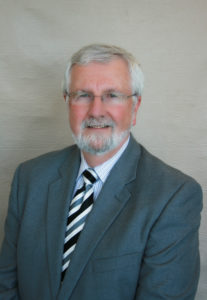
Q: What is your profession and how long have you been in this profession?
A: Retiree. For over 50 years worked as an executive in the fields of child and adolescent mental health, special education and child welfare as well as a children and youth health and human services policy specialist.
Q: What is your journey with mental wellness/health?
A: Most of my career was providing and facilitating services focused on sever mental illness and emotional disturbance. Through the work of the Touchstone Foundation I/we are working to shift “upstream” to facilitate mental wellness efforts as well as to prevent and intervene rapidly to address challenges to the mental health needs of our community.
Q: Why do you think mental health awareness is important?
A: We know from research like the Adverse Childhood Experience (ACE) study that the failure to identify and intervene in the mental and emotional challenges and trauma of children leads to a range of long term negative and tragic physical, emotional, social and economic impact.
Q: What is one piece of advice you would give to children/youth in Lancaster seeking to improve their mental wellness?
A: Find one adult in your life (family, teacher, coach, etc.) that agrees to speak with you each week and be available to hear how you are feeling and coping with the very complex world that you are growing up in.

Carrie Smith, PhD: Lancaster County Resident for 18 Years
Q: What is your profession and how long have you been in this profession?
A: College professor, for 19 years.
Q: What is your journey with mental wellness/health?
A: It’s been a long journey, and it is ongoing! I continue to learn about mental health and wellness, and try to listen to what people are experiencing and what they need. We’ve come a long way towards discussing mental health in a more accepting and open manner, but we still need to continue to educate and advocate. Serving on the board of Touchstone and the Talent Pipeline Committee gives me an opportunity to work on improving access to mental health care in the county. I believe that we can, and should, continue to work and improve mental health education and access. Professionally, I am lucky to have an opportunity to teach a class at Millersville University on the sociology of mental health, where we examine how larger social contexts and structures impact health experiences and outcomes. I have the great privilege of learning from students about their experiences and understanding how they view issues of mental wellness/health. Whenever my students are dispirited, I remind them that while thinking sociologically helps us grasp the enormity and complexity of the problem, it also helps us craft solutions and policies. I’ve also been more aware of the needs of caregivers, being very fortunate to have had tremendous support in my own mental health struggles. I think that’s the next step of my journey – to advocate for and support caregivers.
Q: Why do you think mental health awareness is important?
A: Although there has been real progress, sadly, mental health is still considered a taboo subject too often. Our medical healthcare systems are designed to focus on physical and acute illnesses, and are not well suited to looking at mental/psychological and chronic health concerns. Too many of us find ourselves not knowing where to turn for help, and caregivers need more help and support as well. I think it’s also important to understand that life is often stressful and challenging, and that all of us, at some point, will experience mental and psychological difficulties. We’re all in this together, and we need to continue to support programs and policies that reach out to everyone.
Q: What is one piece of advice you would give to children/youth in Lancaster seeking to improve their mental wellness?
A: As I continue to get older (I am aging as we speak!), I’ve learned that time can be a good friend. Sometimes, things look better in five minutes, one day, a week, a month, or years later. In the meantime, find your people, and build your community of support. Also, find work and activities that are joyful and meaningful to you – whether it’s fishing, reading, or volunteering and helping out.
Samuel Soliman: Lancaster County Resident for 23 Years

Q: Please tell us why you joined Touchstone Foundation’s board.
A: I joined the Touchstone board to help make decisions on bettering the mental wellness of young people in Lancaster. I also wanted to provide a younger perspective on topics when it comes to youth mental wellness.
Q: In your own words, please tell us who you are and what you do in the community.
A: I am a freelance photographer and director. I help create marketing material and campaigns for organizations. I also co-own The Hood Hippie Love Yourself, a mental wellness streetwear brand who has partnered with Touchstone to help create The Rise Above Youth Summit.
Q: What is your profession and how long have you been in this profession?
A: Freelance Photographer and Director, 7 years.
A: I think Mental Health Awareness is important because mental health impacts every aspect of someone’s life. If conversations aren’t had about it then the more people suffer in silence and don’t get to live a full life.
Q: What is one piece of advice you would give to children/youth in Lancaster seeking to improve their mental wellness?
A: My one piece of advice for youth in Lancaster is to find ways to learn about who you are as a person. Learn to connect with yourself and live in your own body since you’ll live in it for a long time.
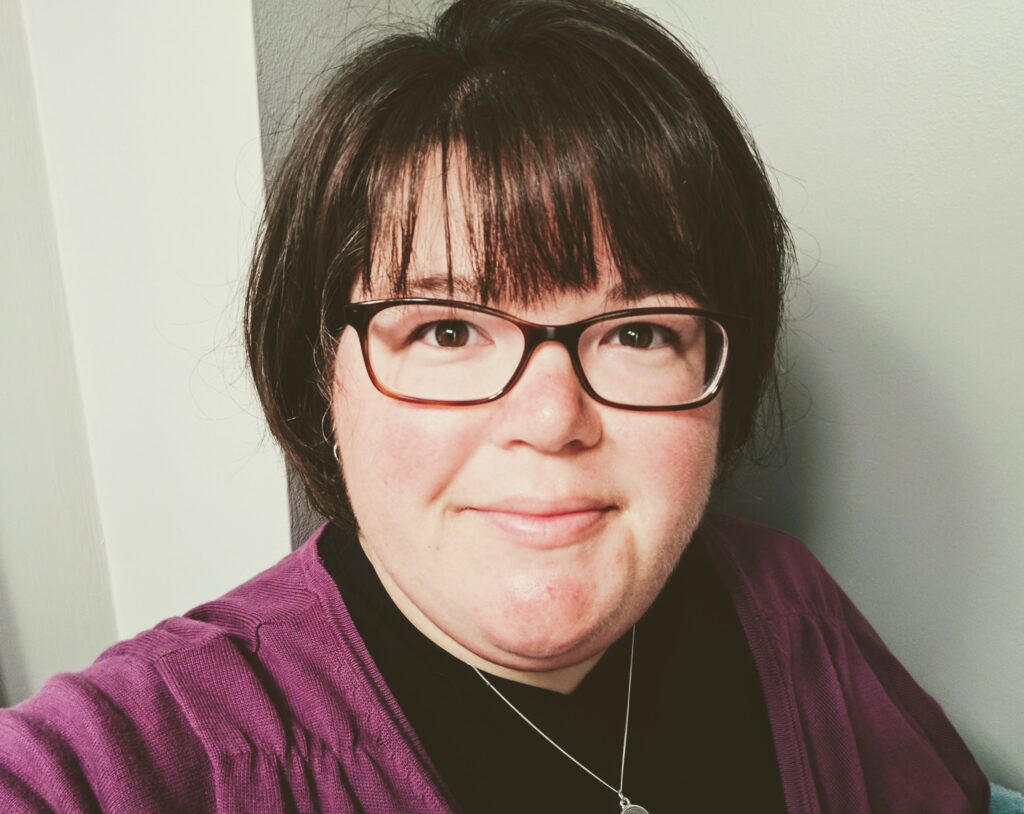
Carli Youndt, MSN, RN: Lancaster County Resident her Entire Life
Q: What is your profession and how long have you been in this profession?
A: I am a registered nurse and currently work at Penn Medicine Home Health. My career has included med-surg nursing, hospice and palliative care, and school nursing.
Q: What is your journey with mental wellness/health?
A: Various forms of trauma played a significant role in the first 20 years of my life. These experiences led to depression, PTSD, and a very taxed nervous system. I’ve done (and continue to do) a lot of work in therapy in order to live a life of healing, wholeness and purpose.
Q: Why do you think mental health awareness is important?
A: Mental health is just as (or maybe more?) important as physical health and I have hope for the day that there is true equity in accessing mental health services. Physical health cannot exist without mental health. I long for the day we stop trying to separate the two and instead, focus care on the complex and unique needs of each person, not a list of diagnoses or “one size fits most” therapy. As a secondary school nurse, the majority of student visits to my office (80-100 per day) were due to a mental health need. Students were overwhelmed by anxiety, stressed by relationships and social media, and struggled with persistent physical symptoms that were often medicalized instead of considering them as being connected to mental health needs.
Q: What is one piece of advice you would give to children/youth in Lancaster seeking to improve their mental wellness?
A: It is so important to have a safe and caring adult in your life. This can be a parent or other family member, a family friend, teacher, coach, mentor, community leader…the possibilities are endless. This person doesn’t need any special credentials or training, they just need to care about you and want what is best for you. Look for the person who’s face lights up when you enter the room.
William J. Zee, Esq.: Lancaster County Resident for 19 Years
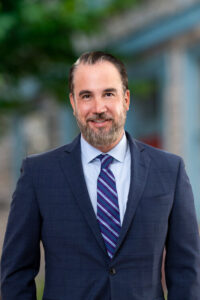
Q: Please tell us why you joined Touchstone Foundation’s board.
A: I joined Touchstone foundation in order to play a more active role in supporting the mental health needs of our community. As a practicing attorney representing schools throughout our region I witness firsthand each day the critical need for increased access to mental health resources for our young people. I have devoted a significant portion of my career to advocating for trauma-informed systems aimed at helping to create environments where individuals can thrive regardless of their life challenges.
Q: In your own words, please tell us who you are and what you do in the community.
A: I am Education Law Group chair at Appel, Yost, and Zee LLP, My practice involves the representation of schools from the pre-K through the college/university level. While I am a generalist school practitioner, I spend a significant amount of time working in the student services space. In addition to my practice I serve a number of non-profits that focus on the needs of young people and mental health and trauma supports. This includes 15 years on the Aaron’s Acres Board of Directors, including several as Board President. Most recently, I have been actively involved as a member of the Board of Directors for the nation Attachment and Trauma network (ATN). I also regularly engage in public speaking and training programs directed at educators wanting to learn more about a variety of student services issues.
Q: What is your profession and how long have you been in this profession?
A: Attorny, 19 years
Q: What is your journey with mental wellness/health?
A: As a young person I experienced significant trauma related to my life circumstances. I carried those experiences into my work, as a high school teacher, college administrator, and ultimately school law attorney. Mental health and wellness is a central focus of my professional practice and my community service. I believe that we must work to eliminate the unfortunate stigma associated with mental health needs, and create an environment where we recognize the interplay between physical and mental health. I highly value lifelong learning and seek out opportunities to further educate myself on leadership and topics where I can leverage my talents to help others.
Q: Why do you think mental health awareness is important?
A: Many of the significant social ills in our society have a large mental health component. This is primarily attributable to the stigma that continues to attach to mental wellness needs. We can do better in our communities, workplaces, and schools to support individuals with their mental health needs, and recognize that we all benefit from supporting rather than isolating those in need of our help.
Q: What is one piece of advice you would give to children/youth in Lancaster seeking to improve their mental wellness?
A: Understand that you are not alone, and that things are not always the way they appear. Social media and aspects of our culture have created myths around who is happy and what it means to be happy in life. Be willing to be vulnerable and seek out authentic relationships. We are social beings and are here to support each other in our journey through life.

